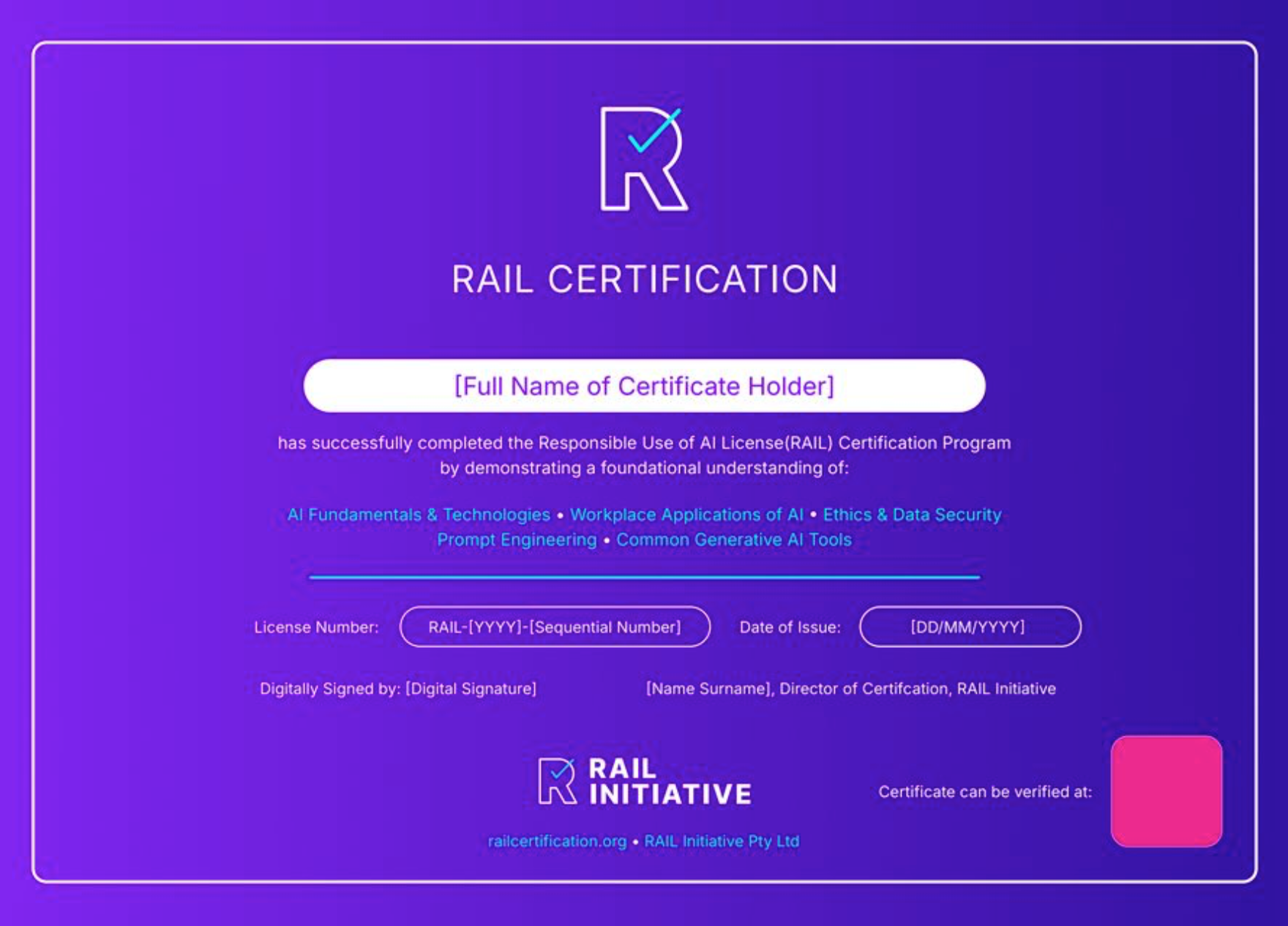Responsible use of AI Licence - RAIL Certification
Subscription
.png?lmsauth=05b2b6d98838091007d0dd36fa59f1279e60adb6) Build & refine AI capabilities whilst demonstrating commitment to ethical AI practices, data security & privacy
Build & refine AI capabilities whilst demonstrating commitment to ethical AI practices, data security & privacy
In the new AI world, businesses will fall into two categories: those who embrace AI, and those who resist it.
The future belongs to the innovators, and those who fail to integrate AI into their operations will be left behind, unable to compete in a rapidly evolving landscape. To survive and thrive, adaptation is essential. RAIL certification helps drive this adaptation by providing a shared understanding of AI concepts and training in core AI skills.
10% Discount! for VET PD Series subscribers - Use your discount code when purchasing!
Why RAIL?
Prepare for the future
As AI tools become increasingly pervasive, those who master their use will lead the way in innovation, efficiency, and problem-solving across all industries and sectors.
Protect your organisation
The risks of unchecked AI adoption by untrained personnel include data security issues, biased decisions, and privacy regulations. RAIL provides needed guidance.
We’re backed by leaders
RAIL is endorsed by industry leaders and has been developed with experts from enterprise, government, and academia to ensure the applicability of course content.
Course details
RAIL is delivered online through engaging video modules and in-depth text content.
Certification is achieved following successful completion of 6 modules.
- Industry Recognition - Widely acknowledged across industry sectors
- Verified Credential - Licence issued on the blockchain via partner Authentical
- Assessment - Multiple-choice examinations for each topic
- Flexibility - Learn at own pace with asynchronous content
- 10 hours - Total volume of learning with additional options
NOTE: This online courses subscription is undertaken via the RAIL Portal - Not via the vetr Portal.
On purchase, all purchasers are provided with information to self-register with RAIL for subscription access.
Core Modules
1 – Introduction to AI
Topic 1.1: Understanding AI Fundamentals and Terminology
- Understand the basics of AI, including its history and development
- Learn about the different types of AI: Narrow AI, General AI, and Artificial Superintelligence
- Explore key AI technologies such as Machine Learning, Natural Language Processing, and Robotics
- Define and explain common AI terminology and concepts.
Topic 1.2: Introduction to Major Generative AI Platforms and Real-World Considerations
- Get introduced to commonly used generative AI platforms
- Understand the potential and limitations of AI in real-world scenarios.
Topic 1.3: Beyond Generative AI
- Explore the diverse landscape of AI applications beyond text and image generation
- Understand the role of AI in data analysis and predictive modeling
- Learn about AI in decision support systems, computer vision, image recognition, robotics and automation, and others
- Examine AI's role in autonomous systems (e.g., self-driving cars, drones).
2 – AI in the Workplace
Topic 2.1: Enhancing Workplace Productivity with AI
- AI Tools for Automation: Learn how AI can automate routine tasks like email sorting and scheduling
- AI-Powered Productivity Platforms: Explore tools for task management, reminders, and organisation
- Other Productivity Gains with AI: Image Creation, Assisting with Spreadsheets, and various other uses
- Sample use cases: Illustrative examples of individual employees and businesses improving productivity using AI.
Topic 2.2: AI Tools for Decision-Making
- Understand the role of AI in improving data-driven decision-making processes
- Learn how AI supports business decisions through predictive analytics and risk assessment
- Explore practical applications of AI in financial analysis and operational decision-making
- Discuss how AI helps leaders make informed decisions by analysing large datasets.
Topic 2.3: AI in Various Industries
- Understand how AI is shaping a range of industries, including a high-level view of its impact on finance, manufacturing, retail, transportation and logistics, marketing,
- education, agriculture, and legal and compliance.
3 – Ethics, Security, and Privacy
Topic 3.1: Practical AI and Ethical Considerations
- Learn about the challenges of implementing AI in businesses (e.g., scalability, costs)
- Explore basic ethical considerations when using AI (e.g., transparency, accountability)
- Understand how to navigate AI systems and ensure responsible use in business environments.
Topic 3.2: Protecting Data in an AI World
- Understand the basics of data privacy and security in AI-driven environments
- Learn simple strategies to protect personal and professional data when interacting with AI systems
- Explore examples of AI-related data incidents and their impact on individuals
- Discover how to improve data security in an AI-enhanced world.
Topic 3.3: The Social Impact of AI
- AI's Influence on Society: Explore how AI is shaping various aspects of daily life, including any potential negative consequences
- AI and Employment: Understand the impact of AI on job markets and future employment opportunities
- Understand basic human rights regarding AI including government responses, with reference to Australia's AI Ethics Principles
- Explore resources for staying informed about AI policies affecting you.
4 – Prompt Engineering
Topic 4.1: Fundamentals of Prompt Design
- Learn the basic principles of creating clear, effective prompts for AI models
- Understand how prompt design influences the behavior of generative AI systems like ChatGPT
- Explore simple examples of prompt design and its outcomes.
Topic 4.2: Crafting Effective Prompts for Common Tasks
- Explore examples of effective prompts for various professional tasks (e.g., writing assistance, generating ideas, research help, solving basic problems, formatting
- assistance)
- How to reduce bias in prompts
- Understand how to refine prompts and reprompt to get better results
- Practice basic prompt design techniques to improve response quality, using ChatGPT, Claude, Gemini, or Meta.
Topic 4.3: Managing Common Risks Associated with Generative AI Responses
- Understanding Generative AI Limitations and Risks
- Identifying and Mitigating AI Hallucinations
- Developing Critical Thinking Skills
- Handling AI-Generated Errors
- Fostering a Culture of Responsible AI Use.
5 - AI for Teachers
Topic 1: AI for Personalised Learning and Student Engagement
- Understand how AI can be used to personalise student learning experiences
- Learn how to use AI tools to identify student learning gaps
- Explore AI-driven platforms for enhancing student engagement.
Topic 2: AI for Classroom Management and Administration
- Master AI tools that assist in automating administrative tasks
- Learn to use AI for managing classroom activities and student records
- Understand how AI can improve communication between teachers, students, and parents.
Topic 3: AI for Professional Development and Teacher Support
- Learn how AI can assist teachers in improving their skills and staying updated
- Understand the role of AI in providing on-demand professional development
- Explore AI-driven tools for teacher collaboration and resource sharing.
Elective Modules
Working with ChatGPT
Duration: Approximately 1 hour
Topic 1: Understanding ChatGPT and OpenAI
- Understand the background of OpenAI and how it positions ChatGPT.
- Identify the key features and capabilities of ChatGPT.
- Recognise the differences between ChatGPT versions (3.5 vs. 4).
- Understand ChatGPT's knowledge cutoff dates and limitations.
Topic 2: Essential ChatGPT Skills
- Navigate the ChatGPT interface effectively.
- Master basic prompt creation for common workplace tasks in ChatGPT.
- Learn conversation management techniques (editing prompts, starting new threads).
- Practice working with ChatGPT's memory limitations within a conversation.
Topic 3: Advanced Features and ChatGPT Plus
- Understand the enhanced capabilities of ChatGPT Plus (GPT-4, DALL-E integration, plugins).
- Learn advanced prompt techniques for complex tasks.
- Explore real-time web browsing capabilities in ChatGPT Plus.
- Understand when to use different GPT models based on task requirements.
Maximising Claude
Duration: Approximately 1 hour
Topic 1: Understanding Claude and Anthropic
- Understand Anthropic's background and their "Constitutional AI" approach.
- Identify Claude's key features and capabilities across different versions (Haiku, Sonnet, Opus).
- Recognise Claude's unique strengths, especially in handling longer contexts and document analysis.
- Understand Claude's knowledge cutoff dates and key limitation.
Topic 2: Essential Claude Skills.
- Navigate Claude's interface effectively.
- Master basic prompt creation tailored to Claude's capabilities.
- Learn how to effectively upload and work with documents in Claude.
- Practice conversation management and maintaining context in long discussions.
Topic 3: Advanced Claude Features
- Understand differences between Claude models and when to use each.
- Master advanced prompt techniques that leverage Claude's strengths in analysis and reasoning.
- Learn effective document analysis techniques using Claude's file handling capabilities.
- Explore Claude's code interpretation and generation features.
Leveraging Google Gemini
Duration: Approximately 1 hour
Topic 1: Understanding Gemini and Google's AI Approach
- Understand Google's AI development approach and Gemini's place in their ecosystem.
- Identify key features across different Gemini versions (Nano, Pro, Ultra).
- Recognise Gemini's unique multimodal capabilities (text, images, code).
- Understand Gemini's integration with Google's search and knowledge graph.
Topic 2: Essential Gemini Skills
- Navigate the Gemini interface effectively.
- Master basic prompt creation that leverages Gemini's real-time search capabilities.
- Learn how to effectively use Gemini's image analysis features.
- Practice working with Gemini's fact-checking and source verification tools.
Topic 3: Advanced Gemini Applications
- Understand when to use different Gemini models based on task requirements.
- Master advanced prompt techniques that leverage Gemini's multimodal capabilities.
- Learn effective code generation and debugging using Gemini.
- Explore Gemini's integration with Google Workspace tool.

A Subscription recognition is issued on commencing the subscription.
The RAIL Licence is issued on completion of all required courses.
![]()
CORE AREAS
TRAINING
- Facilitating Training
- Plan and prepare for vocational training
ENGAGING AND SUPPORTING VET STUDENTS
- Supporting Learning
- Support individual and group learning
ASSESSMENT
- Conduct Assessment
- Plan and prepare to conduct assessment
EXTENSION AREAS
TRAINING
- Designing Learning Resources
- Plan design and development of print-based learning resources
- Plan design and development of e-learning resources




.png?lmsauth=2acc0ef15462ff34f78f56147cee012135764746)
